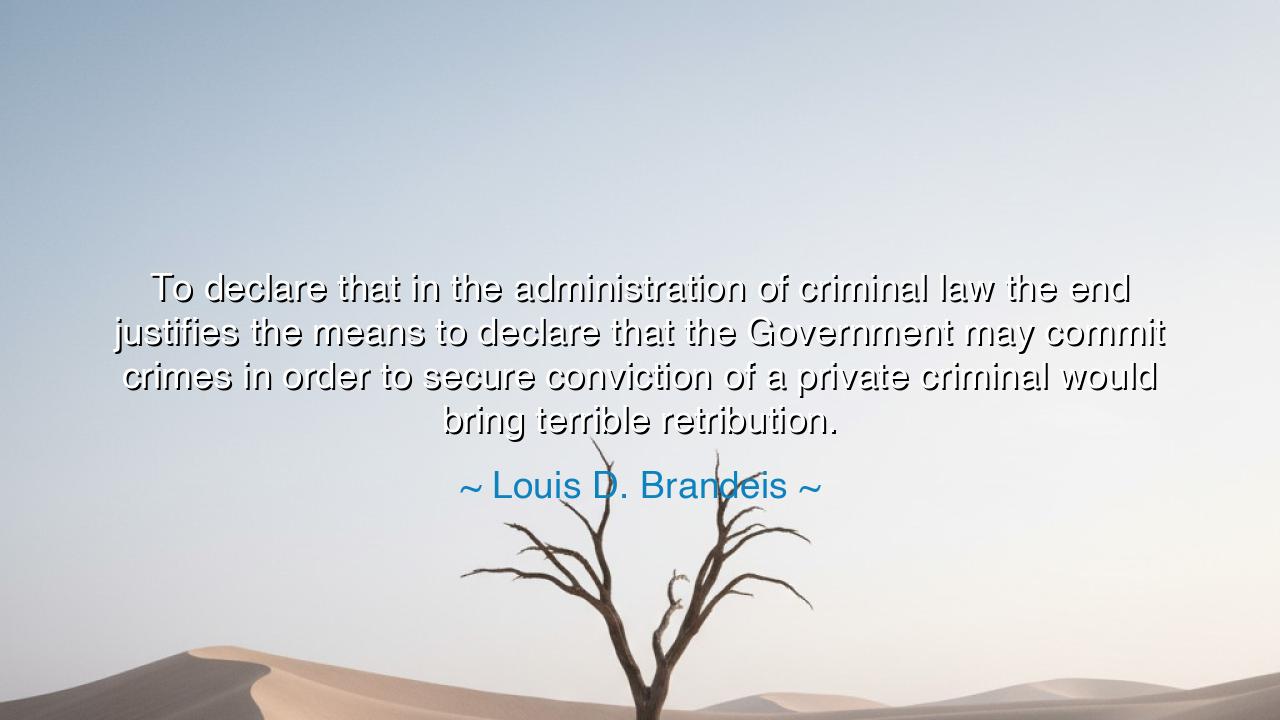
To declare that in the administration of criminal law the end
To declare that in the administration of criminal law the end justifies the means to declare that the Government may commit crimes in order to secure conviction of a private criminal would bring terrible retribution.






The words of Louis D. Brandeis — “To declare that in the administration of criminal law the end justifies the means; to declare that the Government may commit crimes in order to secure conviction of a private criminal would bring terrible retribution.” — thunder like a warning from the mountain of justice itself. In these lines, Brandeis, the great Supreme Court Justice, speaks as both prophet and guardian of the Republic. His voice calls across time, reminding us that law, when corrupted by its own instruments, ceases to be law and becomes tyranny disguised as righteousness. For no nation can claim to be just if its protectors abandon morality in pursuit of victory.
The origin of this quote lies in the crucible of early twentieth-century America, when Brandeis stood firm against the misuse of power by the very institutions meant to uphold justice. He saw with piercing clarity the danger that arises when governments justify wrongdoing in the name of order, when they twist truth to capture the guilty, or break their own laws to preserve them. His warning was not against punishment of the wicked, but against the poison that seeps into the soul of a nation when those sworn to uphold the law believe themselves above it. For when the law becomes a weapon of vengeance, justice dies by its own hand.
In this statement, Brandeis reminds us that the means are as sacred as the ends. The moral strength of a people is not proven in times of comfort, but in the moment when evil tempts them to use evil to destroy evil. He understood that the gravest danger to liberty comes not from the openly lawless, but from those who, cloaked in authority, believe that their cause is too noble to require restraint. Thus he speaks to the ages: Beware the righteous man who believes himself permitted to sin for the sake of justice. For such belief, once accepted, opens the gate to corruption, cruelty, and decay.
Consider the tale of the Salem witch trials, when the rulers of a small colony, fearing unseen evils, abandoned reason for zeal. They broke their own rules of evidence, tortured confessions from the innocent, and called it divine justice. They believed the end justified the means — that the destruction of supposed evil excused the perversion of process. Yet in their fervor, they became the very thing they feared. The courts of Salem did not cleanse their land of darkness; they brought darkness into the heart of their community. Only after years of suffering and regret did the people awaken to their error — the terrible retribution Brandeis foretold.
Brandeis’s words also echo the spirit of the Founding Fathers, who forged a government of laws, not of men. They knew that liberty could survive only if power remained bound by principle. The Constitution was their covenant — not to guarantee perfect outcomes, but to ensure righteous means. For a single wrongful conviction secured by deceit is more dangerous than a hundred crimes left unpunished, for it teaches the state to lie in the name of virtue. The moment the government commits crimes to catch criminals, it declares war upon its own soul.
The teaching is eternal: Justice must be pure, or it is not justice at all. A nation cannot steal, deceive, or coerce in the name of righteousness without summoning ruin upon itself. When the government becomes lawless, its people learn lawlessness. When it breaks the very principles it enforces, faith in the law collapses, and chaos takes root. The terrible retribution that follows is not divine wrath, but the inevitable consequence of hypocrisy — the collapse of trust between rulers and the ruled, between the governed and the governing.
Therefore, let this be the lesson for all who hold power — and for all who would hold them accountable. Never sacrifice integrity for expedience. Let truth be your weapon, and fairness your shield. Uphold justice not merely when it is easy, but especially when it is hard. For the strength of a society lies not in how swiftly it punishes wrong, but in how faithfully it protects right. Each generation must guard the sacred bond between principle and power, lest they too invite the retribution that follows moral betrayal.
So remember these words of Brandeis as an eternal commandment: the law is not a tool of vengeance, but a covenant of conscience. When we preserve its purity, we preserve our freedom. When we forsake it, even in the name of good, we forfeit the soul of our nation. Let no government, no leader, no citizen ever forget — the end never justifies the means when the means destroy justice itself.






AAdministratorAdministrator
Welcome, honored guests. Please leave a comment, we will respond soon